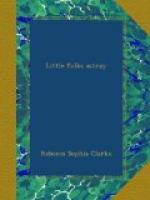“Cyrus Brooks, Number Blank, Blank Street, ma’am. Before the accident, we lived on Thirty-third Street, in very good shape; but, little by little, we were obliged to sell off, and finally had to move into pretty snug quarters. But we’ve always got enough to eat, such as it was,” added the good woman, trying not to show much she enjoyed her lunch.
“I am very glad Providence has sent you here, Mrs. Brooks,” said Aunt Madge, warmly. “I know Colonel Allen will seek you out when he comes home next week; but I shall not wait for that; I shall write him this very night.”
Mrs. Brooks’ heart was so full that she had to cry into a coarse purple handkerchief of Bennie’s, which happened to be in her pocket, and felt very much ashamed because she could not find her voice again, or any words in which to tell her gratitude. It was just as well, though. Mrs. Allen knew words were not everything. It gave her pleasure to fill a huge basket with nice things—wine and jelly for the sick man, plain food for the family, and a pretty woolen dress for Maria, which had been intended for Mrs. Fixfax, the housekeeper.
The children looked on delighted, while the basket was filled with these articles, then passed over to Nathaniel, who was going home with Mrs. Brooks. It was amusing to watch Nathaniel, with the monstrous burden in his hands trying to help Mrs. Brooks down the front steps; for Aunt Madge was not enough of a fine lady to send the pair around by the servants’ door.
It was pleasant, too, to watch Mrs. Brooks’s happy face, half hidden in the hood of her water-proof cloak, which kept puffing out, in the high wind, like a sail. She was going home to tell her husband the Lord had heard her prayers, and she had found a friend.
“And you may depend I never talked so easy to anybody in my life, pa;” this was what she thought she should say. “I didn’t have to beg. Mrs. Allen is one of the Lord’s own; I saw it the minute I clapped my eyes on her face.”
“I am going to see that woman to-morrow, and ask some questions about her blind daughter,” said Aunt Madge, turning away from the window.
“Ask ’bout her nose, too.”
“Whose nose, Fly?”
“The woman’s. It keeps a-moving when she talks.”
“There, who else noticed that?” exclaimed Horace, tossing his young sister aloft. “It takes Fly, with her little eye, to see things.”
“But I didn’t ask her nuffin ’bout it, though, Horace Clifford. God made her so, with a wire in.”
Everybody smiled at the notion of Mrs. Brooks being a wax doll.
“What a queer day it has been!” said Prudy. “Nothing but hide and seek. We’ll all keep together next time, and lock hands tight.”
“Of course,” said Dotty, quickly; “but look here; don’t you think ’twould be safer not to let Fly go with us? She was the one that made all the fuss.”
“Want to know if she was,” said Horace, slyly. “Guess there are two sides to that story.”




